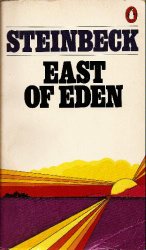East of Eden
by John Steinbeck
A Review by Scott finished Sept. 29, 2009
This review will contain spoilers!
In many sentences:
There are so many good things that can be said about East of Eden that it is hard to know where to start, so I'll start with something simple. This is probably not something I would have noticed if I had not just read Fall of Hyperion (and maybe not even something that most people think about at all) but after what I said about Fall it's only fair to bring it up again. Throughout East, a chapter will start with the narrator (John Steinbeck) speaking in first person. He will then transition subtly, practically imperctibaly if you aren't looking out for it, to a third person telling of the main story at hand. These transitions are so perfectly done, however, that it makes the abrupt and jarring changes in Fall even more noticable. Again, this may seem like a minor point to bring up, but I think it is a perfect example of how beautifully this book is written.
Now, for the meat of the work. There is, of course, the major parallels in the story between the Biblical story of Cain and Abel and the lives of Charles and Adam as well as Cal and Aron. In each case, one brother (the A brother, to keep in simple) gives a gift to their father which is accepted in spite of it's relatively small value. The C brother, on the other hand, gives a gift of greater value that is rejected by the Father. (Just to provide the specifics: Charles gives his father a gold watch, Adam a stray dog. Cal gives his father $15,000.00, Aron goes to college).
Cain, we learn through the discussion Lee has with Samuel and Adam, then has the choice to live a life that overcomes sin. Timshel, thou mayest, is the command given to Cain by God. Charles, however, is never given this command. Fortunately, at the prodding of Lee, Adam has the courage and strength to say the very same word to Cal as he lies on his death bed. The power of this word at the very end of the book cannot be understated. As I was reading the last 100 pages, seeing where things were headed, I thought "there is no way in which the ending of this book is not overwhelmingly tragic." Obviously, however, the ending was not pure tragedy. Certainly there was sadness in the death of Aron and in Adam's stroke. Adam's blessing to Cal, however, was such a beautiful display of strength and love that I could not help but be full of hope upon concluding the book. Adam broke the cycle his father had set up, and gave Cal the most important gift of all: the ability to choose his destiny for himself, rather than being forced down a certain path.
So, is Adam the father of Cal and Aron, or is Charles? There answer is not clear in the book, but my gut tells me that Charles is definitely the father of Cal. Their personalities and actions throughout the book are very similar and it seems likely that Steinbeck wanted us to think this was the case. Aron, however, may have actually been Adam's son. How is this possible since they were twins? After the birth, Samuel tells us that they were actually born in different sacs, each of their own egg, which means it is technically possible that each egg was fertilized by a different man. Though unlikely in reality, it provides an interesting framework for the book since it gives us a clearer reason why Adam would inherently prefer Aron over Charles. Again, there is not firm evidence for this, but it is how I choose to interpret it for now.
Another question I had was, is the John Steinbeck the narrator THE John Steinbeck? Was his grandfather really Samuel Hamilton, and was there really a Trask family in the Salinas valley? I still don't know, but it was great reading the book thinking "these events may really have happened in some way". The way the story is told certainly gives the impression that John is telling us a story about the town he grew up in. In fact, if we ask our own parents to tell us the story of how they ended up where they are now, and how their parents got to where they are, it's easy to see how ever family has a story that would make a good book. If you have a John Steinbeck to write it, that is.
This book was fantastic. There really isn't anything else that needs to be said. The characters are perfectly realized, the writing is beautiful, and the story is intimate. One cannot help but recommend such a wonderful book with gusto.
Favorite Quote
"And I made a promise to myself that I would not consider enjoyment a sin. I take a pleasure in inquiring into things. I've never been content to pass a stone without looking under it. And it is a black disappointment to me that I can never see the far side of the moon".
First Line
Last Line
East of Eden
by John Steinbeck
 Original Publication
Original Publication
Sept. 1, 1952
Paperback edition
Oct. 25, 1979
691 pages